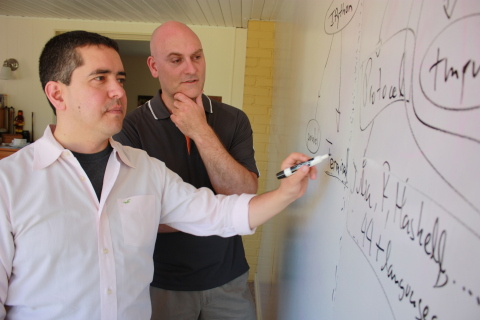Alfred P. Sloan Foundation
See the following -
$6M for UC Berkeley and Cal Poly to Expand and Enhance Open-Source Software for Scientific Computing and Data Science
 Three foundations pledged $6M over the next three years to Project Jupyter, an open-source software project that supports scientific computing and data science across a wide range of programming languages via a large, public, open and inclusive community. Fernando Perez of University of California, Berkeley and Lawrence Berkeley National Laboratory and Brian Granger of California Polytechnic University, San Luis Obispo will lead the project at their institutions. Perez and Granger’s efforts with Project Jupyter are the result of their work developing IPython, a popular user interface for interactive computing across multiple programming languages.
Three foundations pledged $6M over the next three years to Project Jupyter, an open-source software project that supports scientific computing and data science across a wide range of programming languages via a large, public, open and inclusive community. Fernando Perez of University of California, Berkeley and Lawrence Berkeley National Laboratory and Brian Granger of California Polytechnic University, San Luis Obispo will lead the project at their institutions. Perez and Granger’s efforts with Project Jupyter are the result of their work developing IPython, a popular user interface for interactive computing across multiple programming languages.
- Login to post comments
Academic Biomedical Research Community Should Take Action to Build Resilience to Disasters
 The academic biomedical research community should improve its ability to mitigate and recover from the impacts of disasters, says a new report from the National Academies of Sciences, Engineering, and Medicine. The consequences of recent disasters, from hurricanes to cyberattacks, have shown that the investments of the U.S. federal government and other research sponsors -- which total about $27 billion annually -- are not uniformly secure. The report recommends 10 steps that academic research institutions, researchers, and research sponsors should take to bolster the resilience of academic biomedical research.
The academic biomedical research community should improve its ability to mitigate and recover from the impacts of disasters, says a new report from the National Academies of Sciences, Engineering, and Medicine. The consequences of recent disasters, from hurricanes to cyberattacks, have shown that the investments of the U.S. federal government and other research sponsors -- which total about $27 billion annually -- are not uniformly secure. The report recommends 10 steps that academic research institutions, researchers, and research sponsors should take to bolster the resilience of academic biomedical research.
- Login to post comments
Grants For Innovative Projects To Promote Open Access To Data
The Inter-university Consortium for Political and Social Research (ICPSR) has announced a Challenge Grant program funded by the Alfred P. Sloan Foundation. Through the program, ICPSR will fund innovative projects to promote open access to data, support research transparency, improve data citation, and more generally build good practice in data management and stewardship. Read More »
- Login to post comments
Initiative for Open Citations Making Great Progress
 It is enormously satisfying when a good idea captures the imagination and takes off and that’s precisely what happened with the Initiative for Open Citations (I4OC) over the past 6 months. Citations are the way that researchers communicate how their work builds on and relates to the work of others and they can be used to trace how a discovery spreads and is used by researchers in different disciplines and countries. Creating a truly comprehensive map of scholarship, however, relies on having a curated machine-readable database of citation information, where the provenance of every citation is clear and reusable. With the launch of I4OC that map, and the potential for anyone to use it to explore the scholarly landscape, comes much closer...
It is enormously satisfying when a good idea captures the imagination and takes off and that’s precisely what happened with the Initiative for Open Citations (I4OC) over the past 6 months. Citations are the way that researchers communicate how their work builds on and relates to the work of others and they can be used to trace how a discovery spreads and is used by researchers in different disciplines and countries. Creating a truly comprehensive map of scholarship, however, relies on having a curated machine-readable database of citation information, where the provenance of every citation is clear and reusable. With the launch of I4OC that map, and the potential for anyone to use it to explore the scholarly landscape, comes much closer...
- Login to post comments